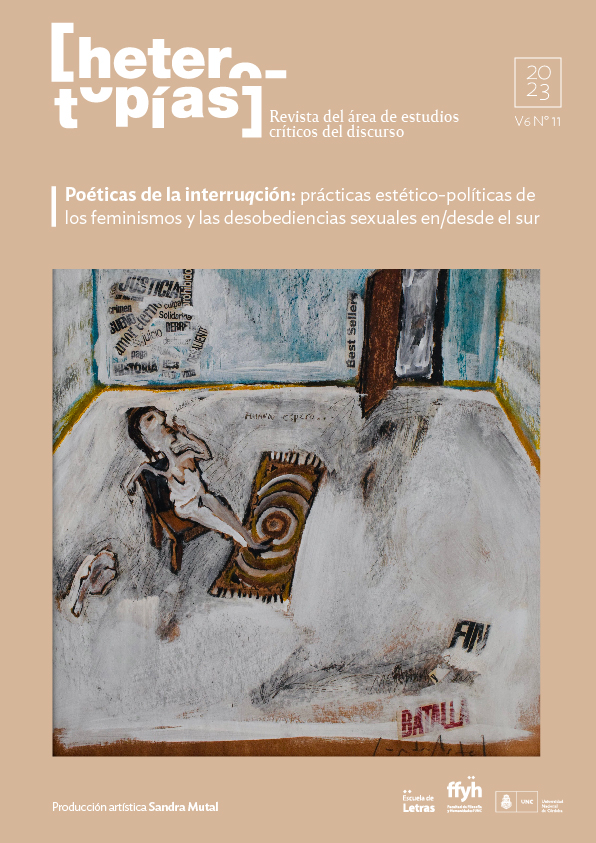Debates in local feminism against the punitive turn. Outlines of a long-term resistance.
Main Article Content
Abstract
This work aims, on the one hand, to outline some characteristics of the configuration of what sociologists, philosophers, and criminologists have named “punitive turn” (e.g., Garland, Larrauri, Wacquant) and how this turn has related to sexual panic and
neoconservatism elements of neoliberalism (Cohen, Pitch, Brown). On the other hand, we attempt to reflect on how these characteristics had permeate with idiosyncratic elements of the discourses and actions displayed by some parts of the local feminist movement faced with the feedback of notable cases (such as Nahir Galarza and Micaela García). Finally, we try to show that counter to such interlocked trends, there exists a resistance that draws attention to the ways in which this punitive reconfiguration of feminist claims has undermined the aims of the movement itself and has reinforced control, surveillance, and harassment devices as the flip side of the discourse of rights.
Downloads
Article Details

This work is licensed under a Creative Commons Attribution-NonCommercial-ShareAlike 4.0 International License.
Those authors who have publications with this journal, accept the following terms: Those authors who have publications with this journal, accept the following terms:
a. The authors will keep their copyright and guarantee to the journal the right of first publication of their work, which will be simultaneously subject to the Creative Commons Attribution - Non-Commercial - Share Alike (by-nc-sa) Attribution License; no commercial use of the original work or any derivative works is allowed, the distribution of which must be done with a license equal to the one that regulates the original work.
b. Authors may adopt other non-exclusive license agreements for the distribution of the published version of the work (e.g., deposit it in an institutional telematic archive or publish it in a monographic volume) provided that the initial publication in this journal is indicated.
c. Authors are allowed and recommended to disseminate their work through the Internet (e.g. in institutional telematic archives or on their website) before and during the submission process, which may lead to interesting exchanges and increase the number of citations of the published work. (See The effect of open access).
How to Cite
References
Arbuet Osuna, Camila (2020). “Esbozos para un feminismo antipunitivista”. Las torres de Lucca. Revista internacional de filosofía política. Vol. 9, Nº. 17 (Julio-Diciembre).
Arduino, I. (2018). Entre la victimización opresiva y la justicia emancipatoria: articulaciones entre feminismo y justicia penal. En Nijensohn (comp.) Los feminismos ante el neoliberalismo. Buenos Aires: La Cebra.
Asensio, Raquel (2019). Discurso en la Reunión de la Comisión de Justicia y Asuntos Penales del Senado de la Nación, 08/05/2012. Disponible en: https://www.senado.gob.ar/upload/18879.pdf
Athanasiou, A. (2018). States of emergency, modes of emergence Critical enactments of ‘the people’ in times of crisis. Critical Times in Greece. Nueva York: Routledge.
Azcue, Ludmila (2019). “Herramientas del amo destruyen casa de la mujer”, en Revista Bordes. Universidad Nacional de José C. Paz, 30 de junio. Disponible en: http://revistabordes.unpaz.edu.ar/herramientas-de-amo-destruyen-casa-de-mujer/#_edn4
Brown, W. (2020) En las ruinas del neoliberalismo: El ascenso de las políticas antidemocráticas en Occidente. Buenos Aires: Tinta Limón.
Butler, Judith (2017). Cuerpos aliados y lucha política. Buenos Aires: Paidós.
Daich, D. y Varela, C. (2015). Trata y trabajo sexual. Problematizaciones antropológicas. Quehaceres, 2015, no 2.
Daich, Déborah (2013). “De pánicos sexuales y sus legados represivos”, , en Zona Franca. Revista del Centro de Estudios Interdisciplinario sobre Mujeres, Año XXI, Nº 22.
Davis, Ángela (2016). Democracia de la abolición. Madrid: Trotta.
Garland, David (2001). La cultura del control. Crímen y orden social en la sociedad contemporánea. Barcelona: Gedisa.
Gutiérrez, Mariano H. (2011) “Trazos para delinear el “populismo punitivo” en el caso argentino”, en Mariano H. Gutiérrez comp. Populismo punitivo y justicia expresiva, Buenos Aires: Fabián J. Di Placido Editor.
Larrauri, Elena (2006) Populismo punitivo…y cómo resistirlo. Jueces para la democracia, (N° 55), 15-22.
Núñez Rebolledo, Lucía (2019). “El giro punitivo, neoliberalismo, feminismo y violencia de género”. Política y Cultura, N° 51 (Enero - Junio).
Pitch, Tamar (2020). Feminismo punitivo. En Daich y Varela (Comp.), Los feminismos en la encrucijada del punitivismo, Buenos Aires: Biblos.
Segato, Rita (2018). “Crímenes menores”. Nota de Sandra Miguez. Página/12 (27 de julio). Disponible en: https://www.pagina12.com.ar/130969-crimenes-menores
Trebisacce Marchand, Catalina (2020). “Un nacimiento situado para la violencia de género. Indagaciones sobre la militancia feminista porteña de los años 80”. Anacronismo e irrupción, Vol. 10, N° 18 (Mayo - Octubre)
Valencia, Sayak (2010). Capitalismo gore. España: Melusina.
Vallespín, Fernando y Bascuñán, Máriam M. (2017). Populismos. Madrid: Alianza.
Vance, Carole (comp.)(1989). Placer y peligro. Explorando la sexualidad femenina. Madrid: Ed. Revolución.
Wacquant, Loïc (2009). Castigar a los pobres. Madrid: Gedisa.
